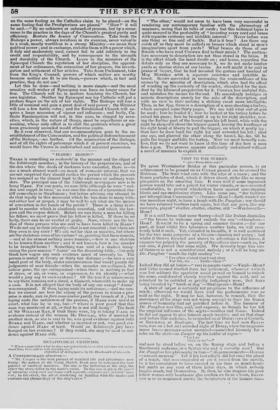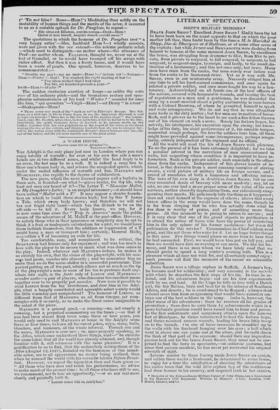VISIT TO THE SURREY.
" bitter cold."
To cross Westminster Bridge at this particular season, is an achievement to be paused on as CIESAR paused ere he crossed the Rubicon. The frost wind cuts with the edge of a razor ; and the frozen particles of dust, which it drives about, strike like so many pin-points on the smarting face. It were well if some ingenious person would take out a patent for winter vizards, or new-invented comfortables, to protect whiskerless faces against nose-nipping blasts and eye-moistening atoms. Like some one, " iter facturus per inhospitalem Caucasum "—Horace—Hem !—forth wended we one merciless night, to have a laugh with Dr. Pangloss; nor should we have returned bootless hack again, but that our jaws, like any castanets, played" chatter, chatter, chatter, still "—Wordsworth— Hem !
It is a cold house that same Surrey—built like Italian domiciles —" the breeze to welcome and exclude -.the sun"—Ourselves- Hem ! It ought to be a spring and summer theatre ;—for our part, at least whilst this tyrannous weather lasts, we will reve- ready hold it such. Yet, extended in breadth, it is well contrived for the two main purposes of a theatre—hearing and seeing ; but whilst it throws forward and shows to advantage a full house, it exposes too palpably the poverty of threadbare ones—such as, for our sins, it proved that same night. We devoutly hope this vice i of thinness s not a constitutional malady ; or it will be long ere Dr. Pangloss "reach the right reading "— " I've often wished that I had clear
For life, six . . Swift—Hem !"
Indeed they did sit below—" rani in gurgite vasto"—Virgil—Hem! and Echo seemed startled from her retirement, whenever (which was but seldom) the spectator could prevail on himself to unlock his arms, confederated closely together against the cold, and as reluctant to be unfolded as prickly hedgehog's nose, that fears being tweaked by "tooth of dog"—Shakspeare—Hem
A.state of torpor is certainly not propitious to the influence of mirth ; otherwise we would have said the performance was as cold as the night. It may be fair, however, to remark, that the merriment of the stage was not warm enough to thaw the frozen manes of humanity that sat petrified before it. The humour of Dr. Pangloss was thin, cold, and vapoury, as though he too felt the ungenial influence of the night—weather and house. Indeed he did not appear to give himself much trouble; and on that stage and before that audience, he reminded us of Dionysius at Corinth, or BaummEa at Boulogne. The last time we had seen ELms- TON, was on a hot and crowded night of Drury, when the magnani- mous lessee-manager-actor mounted—somewhat leisurely for a rake on the alert—as Ranger up his ladder of ropes- " up I go Neck or and now he stood before us, on the Surrey stage and before a Southwark audience, in a Syntax wig and a carrolly coat But Dr. Pangloss has philosophy in him—"yEquam memento—Horace —servare meniem." Yet if his best efforts did but raise the ghost of a laugh, that was congealed or ere it issued from the mouth, be it his consolation to have created in his time as much heart- felt mirth as any man of these latter days, in which nobody laughs much, but Democritus. If, then, he who inspires his poor fellow worms with heartsome glee confers on them a boon, Elam- TON is to be numbered among the benefactors of the human race. (" 'Tis not false !—Rowe—Hem!") Meditating thus coldly on the mutability of human things and the merits of the actor, it occurred to us as a suitable epitaph for Dr. Pangloss, to repeat—.
" Hic situs est Elliston, curras auriga—Ovid—Hem !
Quem si non tenuit, ntagnis tanaen excidit ausis."
The quotations in which the humour of Dr. Pangloss (not" a very happy satire"—Mrs. Inchbald Hem !—) wholly consists, were not given with the ore rotunda—the solemn pedantic relish —which used to distinguish—no matter where—the utterance of Prof—no matter whom. ELLISTON, thought we, never sat at the feet of Gamaliel, or he would have twanged off his scraps with richer effect. But then it was a frosty house, and it would have been a waste of pearls. One speech, however, deserves to be commemorated :— "Double my pay I—say no more—Done !—‘.Actum est '—Terence- lIem !—Waiter I—Gad ! I've reached the right reading at last !—
" I've often wished that I had clear
For life, six hundred pounds a year--" Swift—Hem I—Waiter I" The sudden stentorian exertion of lungs—so unlike the sotto vow of his ordinary pitch—and the tremulous ecstacy and syco- phantic submissiveness of his loud " Waiter.'" sounded for once like him, " qui quondam "—Virgil—Hem !—set Drury "in a roar" —Shakspeare--Hem !
* There never was much of the "neck or no" in Ellision's Ranger. Mrs. Sid. dons, on a visit late in life to Drury Lane, to see the Stispicious Rveband, is said to have exclaimed—" Bless me, is Ms the tone of the modern stage!" She remem- bered, says Mr. Boaden, when once, in her noviciate, it fell to her lot to be his Mrs. Strickland, the quick vivacious tones of Garrick as he sprung alertly up the ladder, together with her own palpitations at the sound or his voice, as she stood waiting the rise of the curtain, and thinking fearfully how she was to comport her- self in the trying scene with the formidable Ranger—placed between two tires, the eye of the house, and the yet more terrible eye of the great actor.



















 Previous page
Previous page